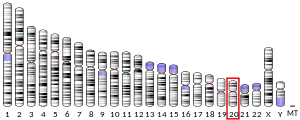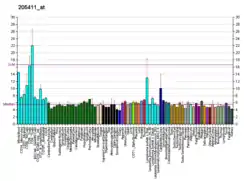STK4
Serine/threonine-protein kinase 4 is an enzyme that in humans is encoded by the STK4 gene.[5][6][7]
Function
The protein encoded by this gene is a cytoplasmic kinase that is structurally similar to the yeast Ste20p (sterile 20 protein) kinase, which acts upstream of the stress-induced mitogen-activated protein kinase (MAPK) cascade. The encoded protein can phosphorylate myelin basic protein and undergoes autophosphorylation. A caspase-cleaved fragment of the encoded protein has been shown to be capable of phosphorylating histone H2B. The particular phosphorylation catalyzed by this protein has been correlated with apoptosis, and it's possible that this protein induces the chromatin condensation observed in this process.[8]
Interactions
STK4 has been shown to interact with PRKRIR.[9]
STK4 has also been shown to prevent, through Yap1 coactivator modulation, haematological tumor cell apoptosis.[10]
References
- GRCh38: Ensembl release 89: ENSG00000101109 - Ensembl, May 2017
- GRCm38: Ensembl release 89: ENSMUSG00000018209 - Ensembl, May 2017
- "Human PubMed Reference:". National Center for Biotechnology Information, U.S. National Library of Medicine.
- "Mouse PubMed Reference:". National Center for Biotechnology Information, U.S. National Library of Medicine.
- Taylor LK, Wang HC, Erikson RL (November 1996). "Newly identified stress-responsive protein kinases, Krs-1 and Krs-2". Proc. Natl. Acad. Sci. U.S.A. 93 (19): 10099–104. Bibcode:1996PNAS...9310099T. doi:10.1073/pnas.93.19.10099. PMC 38343. PMID 8816758.
- Graves JD, Gotoh Y, Draves KE, Ambrose D, Han DK, Wright M, Chernoff J, Clark EA, Krebs EG (June 1998). "Caspase-mediated activation and induction of apoptosis by the mammalian Ste20-like kinase Mst1". EMBO J. 17 (8): 2224–34. doi:10.1093/emboj/17.8.2224. PMC 1170567. PMID 9545236.
- Ura S, Masuyama N, Graves JD, Gotoh Y (August 2001). "Caspase cleavage of MST1 promotes nuclear translocation and chromatin condensation". Proc. Natl. Acad. Sci. U.S.A. 98 (18): 10148–53. Bibcode:2001PNAS...9810148U. doi:10.1073/pnas.181161698. PMC 56930. PMID 11517310.
- "Entrez Gene: STK4 serine/threonine kinase 4".
- Lin Y, Khokhlatchev A, Figeys D, Avruch J (December 2002). "Death-associated protein 4 binds MST1 and augments MST1-induced apoptosis". J. Biol. Chem. 277 (50): 47991–8001. doi:10.1074/jbc.M202630200. PMID 12384512.
- Cottini F, Hideshima T, Xu C, Sattler M, Dori M, Agnelli L, ten Hacken E, Bertilaccio MT, Antonini E, Neri A, Ponzoni M, Marcatti M, Richardson PG, Carrasco R, Kimmelman AC, Wong KK, Caligaris-Cappio F, Blandino G, Kuehl WM, Anderson KC, Tonon G (2014). "Rescue of Hippo coactivator YAP1 triggers DNA damage-induced apoptosis in hematological cancers" (PDF). Nat. Med. 20 (6): 599–606. doi:10.1038/nm.3562. PMC 4057660. PMID 24813251.
Further reading
- Choi J, Oh S, Lee D, Oh HJ, Park JY, Lee SB, Lim DS (2009). Kaeberlein M (ed.). "Mst1-FoxO signaling protects Naïve T lymphocytes from cellular oxidative stress in mice". PLOS ONE. 4 (11): e8011. Bibcode:2009PLoSO...4.8011C. doi:10.1371/journal.pone.0008011. PMC 2776980. PMID 19956688.
- de Souza PM, Lindsay MA (2004). "Mammalian Sterile20-like kinase 1 and the regulation of apoptosis". Biochem. Soc. Trans. 32 (Pt3): 485–8. doi:10.1042/BST0320485. PMID 15157167.
- Han S, Stuart LA, Degen SJ (1991). "Characterization of the DNF15S2 locus on human chromosome 3: identification of a gene coding for four kringle domains with homology to hepatocyte growth factor". Biochemistry. 30 (40): 9768–80. doi:10.1021/bi00104a029. PMID 1655021.
- Gerber MJ, Drabkin HA, Firnhaber C, Miller YE, Scoggin CH, Smith DI (1988). "Regional localization of chromosome 3-specific DNA fragments by using a hybrid cell deletion mapping panel". Am. J. Hum. Genet. 43 (4): 442–51. PMC 1715492. PMID 2902784.
- Creasy CL, Chernoff J (1995). "Cloning and characterization of a human protein kinase with homology to Ste20". J. Biol. Chem. 270 (37): 21695–700. doi:10.1074/jbc.270.37.21695. PMID 7665586.
- Schultz SJ, Nigg EA (1993). "Identification of 21 novel human protein kinases, including 3 members of a family related to the cell cycle regulator nimA of Aspergillus nidulans". Cell Growth Differ. 4 (10): 821–30. PMID 8274451.
- Creasy CL, Chernoff J (1995). "Cloning and characterization of a member of the MST subfamily of Ste20-like kinases". Gene. 167 (1–2): 303–6. doi:10.1016/0378-1119(95)00653-2. PMID 8566796.
- Creasy CL, Ambrose DM, Chernoff J (1996). "The Ste20-like protein kinase, Mst1, dimerizes and contains an inhibitory domain". J. Biol. Chem. 271 (35): 21049–53. doi:10.1074/jbc.271.35.21049. PMID 8702870.
- Bonaldo MF, Lennon G, Soares MB (1996). "Normalization and subtraction: two approaches to facilitate gene discovery". Genome Res. 6 (9): 791–806. doi:10.1101/gr.6.9.791. PMID 8889548.
- Lee KK, Ohyama T, Yajima N, Tsubuki S, Yonehara S (2001). "MST, a physiological caspase substrate, highly sensitizes apoptosis both upstream and downstream of caspase activation". J. Biol. Chem. 276 (22): 19276–85. doi:10.1074/jbc.M005109200. PMID 11278283.
- Graves JD, Draves KE, Gotoh Y, Krebs EG, Clark EA (2001). "Both phosphorylation and caspase-mediated cleavage contribute to regulation of the Ste20-like protein kinase Mst1 during CD95/Fas-induced apoptosis". J. Biol. Chem. 276 (18): 14909–15. doi:10.1074/jbc.M010905200. PMID 11278782.
- Lee KK, Yonehara S (2002). "Phosphorylation and dimerization regulate nucleocytoplasmic shuttling of mammalian STE20-like kinase (MST)". J. Biol. Chem. 277 (14): 12351–8. doi:10.1074/jbc.M108138200. PMID 11805089.
- Khokhlatchev A, Rabizadeh S, Xavier R, Nedwidek M, Chen T, Zhang XF, Seed B, Avruch J (2002). "Identification of a novel Ras-regulated proapoptotic pathway". Curr. Biol. 12 (4): 253–65. doi:10.1016/S0960-9822(02)00683-8. PMID 11864565. S2CID 14053233.
- De Souza PM, Kankaanranta H, Michael A, Barnes PJ, Giembycz MA, Lindsay MA (2002). "Caspase-catalyzed cleavage and activation of Mst1 correlates with eosinophil but not neutrophil apoptosis". Blood. 99 (9): 3432–8. doi:10.1182/blood.V99.9.3432. PMID 11964314.
- Glantschnig H, Rodan GA, Reszka AA (2002). "Mapping of MST1 kinase sites of phosphorylation. Activation and autophosphorylation". J. Biol. Chem. 277 (45): 42987–96. doi:10.1074/jbc.M208538200. PMID 12223493.
- Lin Y, Khokhlatchev A, Figeys D, Avruch J (2002). "Death-associated protein 4 binds MST1 and augments MST1-induced apoptosis". J. Biol. Chem. 277 (50): 47991–8001. doi:10.1074/jbc.M202630200. PMID 12384512.







